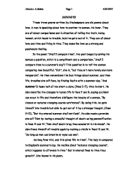So long lives this, and this gives life to thee”. The lady is compared to England’s summer’s day. He realise about “natures changing course”, which happens to all lovers in time “ But in eternal lines to time thou grow’st”. She leaves in his poem.
My mistress’ Eyes is also about comparisons. In this poem there are no compliments. He compares his mistress to beautiful things where she doesn’t fit into the category, “But no such roses see I in her cheeks”. Most of all, he compares her to a goddess, “I grant I never saw a goddess go”. His comparisons seem rude and insulting, but he is being truthful and realistic, “As any she belied with false compare” the poet doesn’t want a false compare, because his lover/mistress is just an ordinary woman. From lines 9-14, he changes his way of thinking, to explain he isn’t just causing his, mistress distress, but he is being honest and he loves her, “I love to hear speak”. He compared his mistress to a goddess, but a goddess is in heaven, his mistress on earth, “Treads on the ground”. Despite all the insulting comparisons, he still stands by the fact by swearing no one can ever love his mistress like him, “And yet by heaven, I think my love as rare”.
Let Me Not To The Marriage is about ideas of love.
The poem is about what love really is and how it is affected by time. He brings out love in marriage “Let me not to the marriage of true minds” to show us the vow of marriage being truthful with your promises, be harmonious.
He spoke about what love is not. He illustrates that love is not love if it changes, “Love is not love which alters when it alteration finds”. He uses repetition, “or bends with the remover to remove”. He describes love as a strong feeling or an unchanging fact “o no, it is an ever fixed mark”, that love is strong “That look on tempest and it never shaken”. He described how to love is like a navigation, that is truelove must be stable and on track, and a guide to us “it is the star to every wand’ ring barque. This is a complicated image.
He also links it to time “love’s not time’s fool”, meaning that love is not a play thing of time if it is constant even during death “with his bending sickle’s compass come” an old image of death as an harvester, a grim fact as we will all die. He also makes this clear in lines 11/12 that if love is stable, nothing can come between, despite our short time on earth even to judgement day, “love alters not with his brief hours and weeks, but bears it out even to the edge of doom”. The poet is very confident about his poem, that he is writing the truth and if it is false that means he never wrote poetry, “if this be error and upon me proved, I never writ, nor no man ever loved.
These poems are about how poetry should be written, about love and the effects of love. They all pointed out that poetry should be written in truth. And they must not be false. They should be about facts and backed with evidence, as they are comparisons with nature for example, which shows the evidence. They are all about being in love with a woman, how they are by speaking out their true minds and comparing them with lovely and unlovely things. They also understand how love is affected by time and how beauty changes. They all relate the consequences of death. This poetry is also about what love can do, the strong impact it has, even possibly make you write a poem!







